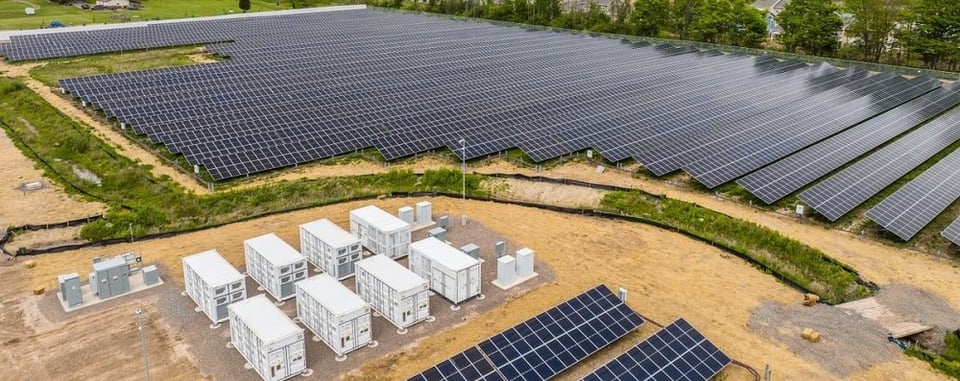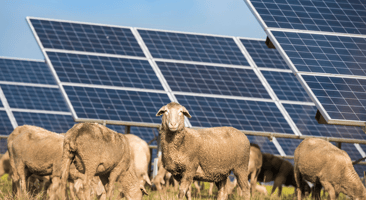Convergent’s Approach to Biodiversity Conservation and Environmental Management

Why Biodiversity Matters to Convergent
2023 was the hottest year in at least 125,000 years. For the first time on record, some daily global average temperatures exceeded the Paris Agreement’s limit of 2° Celsius above pre-industrial levels.
Climate change poses the greatest threat of our time and Convergent Energy and Power (Convergent) is dedicated to mitigating the catastrophic impact of a warming planet on current and future generations by advancing the clean energy transition.
Individually and collectively, we joined the clean energy sector because we saw the writing on the wall; there is a narrowing path to reaching the Paris Agreement goal of limiting global warming. And there is no way to achieve the goals of the Paris Agreement without energy storage. Energy storage (typically in the form of battery storage) allows electricity to be stored—and then discharged—at the most strategic times.
The escalating climate crisis has put increasing pressure on the clean energy transition. While we know that energy storage is the linchpin of that transition, we also know that renewable energy project development—despite its benefits—can still impact local environments.
For that very reason, biodiversity conservation and environmental management are central to how we think about our business—and our planet.
Convergent's Commitment to Biodiversity and Environmental Stewardship
Here at Convergent we are aware that our battery storage and solar PV systems have the potential to negatively impact the local environment, which is why we take proactive measures during our siting and development phases of a project. Convergent recognizes the importance of biodiversity across ecosystems and remains committed to promoting healthy levels of biodiversity in regions in places we own and operate battery storage and solar PV systems—and the places we do not yet.

Convergent is committed to being a responsible environmental steward, especially when it comes to land use. That is why we use the mitigation hierarchy and conservation hierarchy as a guide to achieving a net positive impact. Our goal is to minimize the potential for negative impacts on critical habitats during construction and operation and to restore, and in some cases improve, the land after our systems are decommissioned.
How We Approach Biodiversity and Environmental Management
Avoid
Before we begin development, we evaluate each site for climate, biodiversity, and land integrity risks. We analyze the proposed site for critical habitat—areas of high biodiversity value such as wetlands, marshlands, and threatened ecosystems. We refer to maps of Critical Biodiversity Areas and work with local regulatory codes to ensure our systems will not put local ecosystems and communities at undue risk. We also ensure that our battery storage and solar PV sites will not pose new threats to engendered species.
Our priority is to avoid critical habitats and we believe that some areas are too sensitive to enter. We are committed to avoiding development on World Heritage Sites and are sensitive to the land rights of Indigenous Nations. Before we begin construction, we work with the local community and provide a period for feedback. Our team collaborates closely with landowners, fostering genuine partnerships and listening to their needs and concerns.
Minimize
The reality is that no development is spared from negative impacts on the local environment. To minimize our impact during the development and operation of our systems, Convergent will leverage integrated nature-based solutions that both support the local economy and aim to increase biodiversity. To minimize the impact of our systems we take proactive measures. We are especially aware of how solar panels and cleared ground absorb and retain heat, increasing local temperatures through a “photovoltaic heat island” effect.
One example of how we address this is through the adoption of agrivoltaics. Convergent has conducted extensive research on the value of agrivoltaics to alleviate the strain that increased heat could place on local flora and fauna. Once again, in 2024, Convergent is implementing sustainable vegetation management practices. We have introduced cattle grazing at one of our solar-plus-storage systems to assist in vegetation management, with an opportunity to expand this practice to other locations. Introducing grazing onto the land of a solar PV system not only supports greener practices but also builds strong relationships with local farmers. If you are interested in what it looks like, learn more here: What is Solar Grazing?

Restore
Convergent’s systems are designed to have minimal impact on the land and decommissioning involves seeding all our sites with a seed mix involving native grasses once our equipment has been removed. We are intentional when it comes to avoiding the potential introduction of invasive species to an ecosystem. In addition, we’ve worked on multiple land-use systems where we started with a brownfield and left the site improved. Our diverse planting efforts aim to reduce post-project runoff and blend the site back into the local ecosystem.
At the time of decommissioning our battery storage and solar PV systems, our installed equipment will be removed, repurposed, disposed of, and recycled where possible. The site will be restored to a state similar to its preconstruction condition. The removal of equipment and material will be done in accordance with the applicable regulations and manufacturer recommendations. All necessary permits will be acquired and any authorities having jurisdiction will be notified. Before decommissioning, the site will be de-energized and disconnected from the grid in coordination with all applicable parties. Generally, the decommissioning of the site proceeds in reverse order of the original installation.
Offset
Convergent takes measures to offset the impact of our systems both at the site level and globally. In 2023, Convergent’s systems saved ~21,500 metric tons of CO2, a number expected to increase with the increasing number of solar-plus-storage systems the company is developing.
Sustainability
Our approach to biodiversity conservation is part of our larger commitment to ESG. ESG, which stands for “Environmental,” “Social,” and “Governance,” is baked into our mission, our vision, our hiring process, our company culture, and our operations. In 2023, Sustainalytics rated Convergent as the seventh lowest risk out of the 706 companies they rated within the utilities sector, improving our ESG risk rating from 2022.
How Can Energy Storage Help Your Organization?
If you’re looking for an energy storage partner with a commitment to the clean energy transition and environmentally responsible development, look no further!
Convergent has over a decade of expertise financing, owning, and operating energy storage and solar-plus-storage systems for businesses and utilities to lower energy costs, increase sustainability performance, and improve reliability.
Energy storage is the linchpin of the clean energy transition.
If you’re ready to supercharge your position in the clean energy transition and benefit from an energy storage or solar-plus-storage system, please contact us today to learn more.



